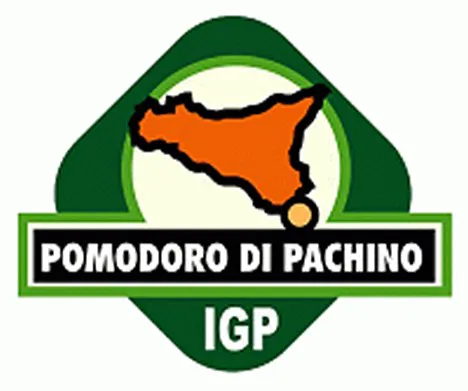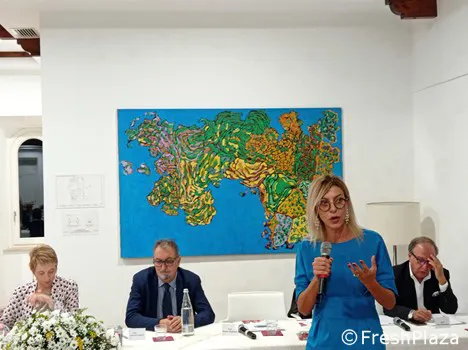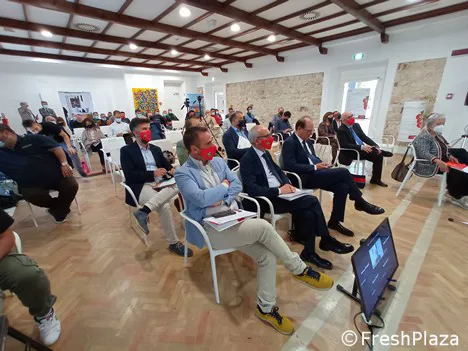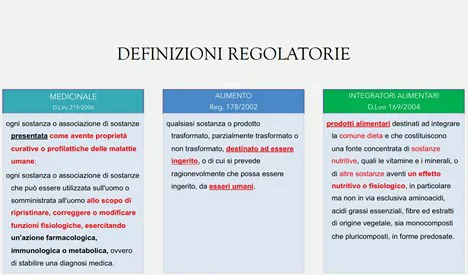The "Le proprietà nutraceutiche della Igp Pomodoro di Pachino" (The nutritional properties of PGI tomatoes from Pachino) convention addressed various topics, including the 'regulatory aspects of nutraceuticals', which were discussed by Tiziana Pecora, a specialist in Pharmacology and an expert in regulatory disciplines.

The speakers table
 "Health and nutrition are strongly related and the world of nutraceuticals plays a fundamental role. The definition of nutraceutical was provided by Stephen L. DeFelice in 1989 as a 'food or part of a food that has a medical or health benefit, including the prevention and treatment of disease'.
"Health and nutrition are strongly related and the world of nutraceuticals plays a fundamental role. The definition of nutraceutical was provided by Stephen L. DeFelice in 1989 as a 'food or part of a food that has a medical or health benefit, including the prevention and treatment of disease'.
In practice, the term 'nutraceutical', although not recognized by European regulations, refers to a food that contains specific constituents and that can therefore have a beneficial effect on a specific body function. Functional foods and supplements are intended as 'nutraceutical' on a commercial level. These food products are disciplined by regulations on the production, communication and trade of foodstuffs," explained the expert.
 Tiziana Pecora
Tiziana Pecora
"A Consensus Document by the European Commission, in agreement with FUFOSE (Functional Food Science in Europe), defines a functional food as a substance that boasts additional qualities due to the presence of components, usually not nutrients, that selectively interact with one or more physiological functions leading to an improved health and well-being and/or a reduced risk of disease."
 (Click here for the photo report)
(Click here for the photo report)
"Legislative Decree 169/2004 defines Food Supplements as food products destined to supplement the common diet and constitute a concentrated source of nutrients such as vitamins and minerals or of other substances having a nutritional or physiological effect. In particular, but not limited to: amino acids, essential fatty acids, fibers and extracts of vegetable origin, both alone and in combination, pre-dosed, or traditional pharmaceutical forms for oral use (capsules, tablets, powders, etc.), through which consumers can take a defined dose of active components. Legislation, especially on a European level, would be advisable and necessary to fill the gaps and address uncertainties, thus adjusting the regulatory framework to the new market and consumer needs and make it possible to sell and advertise said products correctly."
 Slides by Ms. Pecora: "Regulatory definitions" (click here to enlarge)
Slides by Ms. Pecora: "Regulatory definitions" (click here to enlarge)
Sebastiano Barone, technician of the Consorzio del Pomodoro di Pachino Igp, talked about the SQNPI certification (Sistema di qualità Nazionale di produzione integrata - National Integrated Production Quality System), Carbonfoot Print and Blockchain.
 Mr Sebastiano Barone
Mr Sebastiano Barone
"Our consortium, almost 20 years after the mark was first granted and which now boasts approximately 10 million kg of PGI tomatoes traded, aims at sustainability through the attainment of certifications. Most companies producing PGI tomatoes from Pachino are part of POs that have the obligation to apply the integrated production specification of Regione Sicilia. We need to certify this product, which is already obtained with this sustainable system, by joining the SQNPI system. Our specification already excludes the possibility of using chemical or hormonal substances to pollinate flowers and envisages the obligation of entomophilous pollination using bumblebees (Bombus terrestris). In addition, it excludes hydroponic cultivation to obtain the strong identity of the product conveyed by the local soil."
 Partial view of the location that hosted the event on October 12th, 2021. (Click here for the photo report)
Partial view of the location that hosted the event on October 12th, 2021. (Click here for the photo report)
"The greenhouses where PGI tomatoes from Pachino are grown have a low energy impact therefore leading to heavily reduced CO2, this is why we have obtained the Carbon Footprint certification. In fact, our typical Mediterranean cold greenhouses use very little polluting energy, as they are only heated by the greenhouse effect determined by the covers used and by sunlight which, in Pachino, reaches the highest levels in Europe. Northern (north European) greenhouses instead optimize the greenhouse environment to exalt productions using high-tech systems (hydroponic systems employing high energy inputs: induced artificial light, artificial heating systems)."
 Mr. Salvatore Chiaramida, director of Consorzio Pomodoro di Pachino Igp
Mr. Salvatore Chiaramida, director of Consorzio Pomodoro di Pachino Igp
Salvatore Chiaramida, director of the consortium, concluded the convention by thanking the speakers. "Today, we have taken a further step to promote our products. The various speakers clarified how important research and investments are when it comes to nutraceuticals so that PGI tomatoes from Pachino can reach new destinations."
